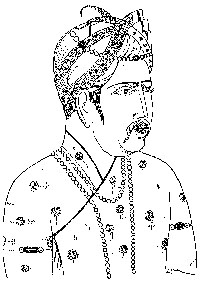 |
| Saturday, March 25, 2000 |
|
 |
THE age-old definition of history that it is a record of achievements of men, still hold good in present times. E.H. Carr has rightly opined that history cannot be written unless the historian can achieve some good contact with the minds of those about whom he is writing. There have been notable personalities in medieval India who have changed the course of history by providing an astute leadership in crisis. Endurance of physical strain was a common feature of medieval warriors. Much depended upon the wisdom, chivalry, cool courage, resourcefulness and timely decisions against opponents. The quality of a general was not judged in the battlefield alone but his display of words — before the commencement of an encounter — was considered an important ingredient for the making of a great general. We have examples of ‘some great oratory’ delivered by great generals before the commencement of an encounter. Their speeches had the desired effect and turned the tide of the battle in their favour, giving them a pulsating victory over the enemy. Even the best military organisation will be useless without the cultivation of military spirit among the soldiers. The arousal of this spirit through speeches and words was a characteristic feature of medieval Indian history. |
 Babar,
founder of the Mughal empire in India, faced some anxious
moments before the battle of Kanwaha (1527) against Rana
Sangram Singh, popularly known as Rana Sanga.
Babar’s men were lacking in confidence after hearing
the heroic tales of Rajput chivalry. Babar rose to the
occasion by delivering a stirring speech, that went as
follows. Babar,
founder of the Mughal empire in India, faced some anxious
moments before the battle of Kanwaha (1527) against Rana
Sangram Singh, popularly known as Rana Sanga.
Babar’s men were lacking in confidence after hearing
the heroic tales of Rajput chivalry. Babar rose to the
occasion by delivering a stirring speech, that went as
follows."My lords and comrades in arms: Do you not know that there lies a journey of some months between us and the land of our birth and our familiar city? If our side is defeated (God preserve us from that day; God forbid it!) where are we? Where is our birth place? Where is our city? We have to do with strangers and foreigners. But let every man remember that whosover enters this world is subject to destruction; for God alone is eternal and unshakable. He who commences the banquet of life must at length drain the cup of death. Better it is to die gloriously than to live with a name disgraced. If I die with glory, all is for the best. Let me leave an honourable name, for certain my body cannot escape death. Almighty God has ordained for us, this fortune, and put before us this noble destiny, that if we are vanquished, we die martyrs, if we conquer, we have won his holy cause. Therefore, let us all swear in the name of the Almighty, that we will never flee, from a death so glorious, and that while our souls are not separated from our bodies, our bodies shall never be separate from the perils of this combat." The response was enthusiastic. The spirit of the army was entirely restored and the soldiers swore by the divorce of their wives, and on the Holy Book, they recited the faith and said, "Oh king! God willing, we will not spare ourselves in sacrifice and devotion, so long as breath and life are in our bodies." Babar’s inspiring address on the eve of Kanwaha has been considered a classic example of eloquent speech.
Akbar, the greatest of the Mughal rulers, was also an accomplished orator. Appealing to his soldiers at Ahmedabad during the second campaign against Mohammad Husain Mirza of Gujarat, he said: "The enemy appears to be numerous yet the favour of God toward this suppliant in divine court is great than man can conceive. It behoves our comrades to hold fast to the cable of the divine favour and not give place to perplexity or alarm. Let them be of one heart, one face and one way, and avoiding distraction and dispersion assail the doomed body of troops which carries red standard." Akbar revealed his identity as a brilliant leader in his arduous second campaign of Gujarat in which he covered the area between Agra and Surat in just eleven days and destroyed the enemy in a tough encounter.
Though Aurangzeb was
endowed with certain laudable qualities — he was a
teetotaller and did not indulge in other vices of the age
and no danger or threat of any kind could unnerve him
— yet he was a colossal failure. Khafi Khan rightly |